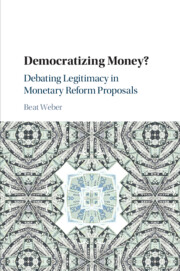Book contents
- Democratizing Money?
- Democratizing Money?
- Copyright page
- Contents
- Preface
- Introduction
- 1 What Makes Money Legitimate?
- 2 Current Monetary Systems
- 3 The Political Economy of Monetary Reform
- 4 Bitcoin
- 5 Regional Money
- 6 Sovereign Money
- 7 Modern Monetary Theory (MMT)
- 8 Money and Democracy in Perspective
- Notes
- References
- Index
7 - Modern Monetary Theory (MMT)
Published online by Cambridge University Press: 28 April 2018
- Democratizing Money?
- Democratizing Money?
- Copyright page
- Contents
- Preface
- Introduction
- 1 What Makes Money Legitimate?
- 2 Current Monetary Systems
- 3 The Political Economy of Monetary Reform
- 4 Bitcoin
- 5 Regional Money
- 6 Sovereign Money
- 7 Modern Monetary Theory (MMT)
- 8 Money and Democracy in Perspective
- Notes
- References
- Index
Summary
- Type
- Chapter
- Information
- Democratizing Money?Debating Legitimacy in Monetary Reform Proposals, pp. 193 - 207Publisher: Cambridge University PressPrint publication year: 2018

